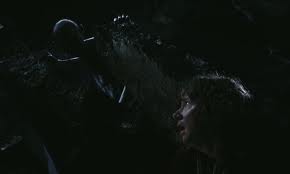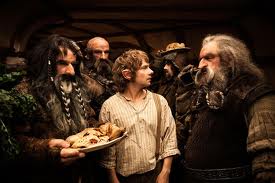The Missing Truth
 So now we can ask: what are the parts or aspects of the story that Bilbo has never told Frodo, that he is planning to reveal for the first time in his memoir? There are two obvious possibilities. First, it’s likely that Bilbo has never admitted that he was initially reluctant to go on the quest, made a fool of himself at the Unexpected Party, and was generally useless to the Dwarves until he saved them from the Mirkwood spiders. (In other words, the version Frodo has heard may be closer to the Rankin-Bass adaptation, where Bilbo is cocky and self-confident from the beginning, thus missing the entire point of the story.) It’s quite possible that the conversation with Frodo that opens the frame story touches on Frodo’s hero-worship of his adventurous uncle and creates some guilt in Bilbo over having misled him. Hence the memoir will set the story straight.
So now we can ask: what are the parts or aspects of the story that Bilbo has never told Frodo, that he is planning to reveal for the first time in his memoir? There are two obvious possibilities. First, it’s likely that Bilbo has never admitted that he was initially reluctant to go on the quest, made a fool of himself at the Unexpected Party, and was generally useless to the Dwarves until he saved them from the Mirkwood spiders. (In other words, the version Frodo has heard may be closer to the Rankin-Bass adaptation, where Bilbo is cocky and self-confident from the beginning, thus missing the entire point of the story.) It’s quite possible that the conversation with Frodo that opens the frame story touches on Frodo’s hero-worship of his adventurous uncle and creates some guilt in Bilbo over having misled him. Hence the memoir will set the story straight.
It’s also likely that Bilbo has omitted details concerning the finding of the Ring and his explanations of it to the Dwarves. In the books, there are in fact three different versions of this story, and the “true” story doesn’t actually appear, but is only alluded to. I think there’s a good chance that Jackson will use the “true” story — and hence be more faithful to Tolkien than Tolkien.
In the first version, Gollum agrees to give Bilbo a gift if Bilbo wins the riddle game, and when he can’t find it, he instead agrees to show him the way out. Bilbo later tells this tale to the Dwarves, the first time omitting his finding the Ring, the second (in Mirkwood) including it. In Tolkien, this is entirely an invention of Bilbo’s to strengthen his claim of ownership for the Ring, and it is the version he sets down in the Red Book of Westmarch. It is also, of course, the version in the first edition of The Hobbit.
What actually seems to have happened is this. The encounter between Gollum and Bilbo is as told in the revised edition of The Hobbit. According to the LOTR Prologue, however, when Bilbo rejoins the Dwarves he lies to them, and tells them the story from the first edition. And he does so again in Mirkwood, simply adding the Ring. Gandalf disbelieves both versions and eventually gets the true story from Bilbo. This true story appears as supplementary material in the Red Book, probably added by Frodo.
The third version of the story is an editorial invention devised by Tolkien for the revised edition of The Hobbit, in order to circumvent the troubling matter of Bilbo’s lie. Here the true story of the encounter with Gollum is given. However, when Bilbo rejoins the Dwarves, Tolkien has him tell them a version of the true story that simply omits the Ring, rather than having him lie. The entire passage of Bilbo’s narration beginning with “So I said: ‘what about your promise? Show me the way out!’ But he came at me to kill me…” and ending with “So I jumped over him and escaped, and ran down to the gate” is not, according to Tolkien, based on the Red Book at all! Even within the fictional universe where Tolkien is just a translator of ancient texts, he made up this part himself.
 This presents Jackson with a very interesting choice. What does Bilbo tell the Dwarves when he rejoins them? Does he tell them a Ring-free version of the truth, as in the published Hobbit? Or does he lie and tell them the “friendly Gollum” version of the story, as Tolkien says he does in the LOTR Prologue? If Jackson does use the “true” version and incorporate Bilbo’s lie to the Dwarves, he could add a scene or two where Gandalf questions Bilbo’s story and eventually gets the true version from him. Going with the “true” version would be consistent with Jackson’s continual emphasis on the Ring’s evil power, and would help make the Ring a darker object than it is in the published book.
This presents Jackson with a very interesting choice. What does Bilbo tell the Dwarves when he rejoins them? Does he tell them a Ring-free version of the truth, as in the published Hobbit? Or does he lie and tell them the “friendly Gollum” version of the story, as Tolkien says he does in the LOTR Prologue? If Jackson does use the “true” version and incorporate Bilbo’s lie to the Dwarves, he could add a scene or two where Gandalf questions Bilbo’s story and eventually gets the true version from him. Going with the “true” version would be consistent with Jackson’s continual emphasis on the Ring’s evil power, and would help make the Ring a darker object than it is in the published book.
Furthermore, in the frame story, Bilbo feels that the parts of the story he has left out are so shameful that he would rather not have to tell them to Frodo face-to-face. That’s why he’s writing the letter. This is absolutely something people do: write a letter saying “I was deceitful to you and I hope you will forgive me by the time we next meet.” It’s a way to remove yourself from the other party’s immediate emotional reaction, and instead only have to deal with them after they have come to terms with your confession.
I think it’s a stretch that Bilbo would feel this reluctant to face Frodo, if all he had done was mislead him about how heroic he was during the first half of the Quest. And clearly he has never lied to Frodo about the Gollum encounter, since in the letter he says that everything he has told him was true. But it’s likely that he never told Frodo that he lied to the Dwarves about it — twice! — and that Gandalf had to browbeat the truth out of him. That might credibly be something he’s so embarrassed about that he would rather tell it to Frodo in a letter than in person.


